- Home
- »
- Clinical Diagnostics
- »
-
Central Lab Market Size And Share, Industry Report, 2030GVR Report cover
![Central Lab Market Size, Share & Trends Report]()
Central Lab Market (2025 - 2030) Size, Share & Trends Analysis Report By Service (Genetic Services, Biomarker Services, Microbiology Services), By End-use (Pharmaceutical Companies, Biotechnology Companies), By Region, And Segment Forecasts
- Report ID: GVR-4-68039-962-2
- Number of Report Pages: 110
- Format: PDF
- Historical Range: 2018 - 2023
- Forecast Period: 2025 - 2030
- Industry: Healthcare
- Report Summary
- Table of Contents
- Segmentation
- Methodology
- Download FREE Sample
-
Download Sample Report
Central Lab Market Summary
The global central lab market size was estimated at USD 3.46 billion in 2024 and is projected to reach USD 5.04 billion by 2030, growing at a CAGR of 6.56% from 2025 to 2030. The growth can be attributed to the increasing investment in R&D and the increased focus of sponsors & investigators on reducing research costs.
Key Market Trends & Insights
- North America central lab market dominated the global industry with a share of 40.82% in 2024.
- The central lab market in Asia Pacific is expected to witness the fastest CAGR of 7.82% over the forecast period.
- By services, the biomarker services segment held the largest share of 38.54% in 2024.
- By end use, the pharmaceutical companies held the largest market share of 44.78% in 2024.
Market Size & Forecast
- 2024 Market Size: USD 3.46 Billion
- 2030 Projected Market Size: USD 5.04 Billion
- CAGR (2025-2030): 6.56%
- North America: Largest market in 2023
Moreover, the increasing adoption of outsourcing laboratory services by pharmaceutical & biotechnology companies and other end users to reduce the overall cost of research activities further supports the market growth over the forecast period. Increased focus on diagnostics owing to COVID-19 led to a rise in funding for novel diagnostics with the potential to improve diagnosis scenarios. For instance, in April 2023, according to LabCentral 2022 Impact Report, companies raised USD 6.05 billion in funding, including 21% of all early-stage funding globally, dosed 4,504 participants in 37 clinical trials, and granted 56 patents. Such strategies are likely to improve the demand for central laboratory services for clinical studies in the country. Furthermore, in March 2021, Bio-Techne Corporation opened a new immunoassay-focused R&D and manufacturing facility in Minneapolis, U.S. This facility is engaged in the production of ELLA immunoassay cartridges for rapid detection of biomarkers for the diagnosis of diseases. Thus, the opening of such manufacturing facilities in countries strengthens the production of immunoassay test kits for the diagnosis of infectious respiratory diseases during the forecast period.
The preference of consumers toward small- and medium-scale enterprises is rising, owing to the presence of depth & breadth of specialty lab solutions. For instance, in February 2023, Cerba Research signed a Memorandum of Understanding (MoU) with Teddy Clinical Research Laboratory to enter into a joint venture with an aim to combine Teddy's well-established reputation in mainland China, known for providing high-quality central lab solutions backed by more than 12 years of clinical trial experience, with Cerba Research's technical capabilities and scientific expertise. Cerba Research excels in areas such as vaccines, immuno-oncology, cell & gene therapy, and infectious disease research and drug development.
The presence of up-to-date and novel instruments in the new laboratory is expected to enhance automation and provide more efficient results with high-quality data. In May 2023, the China Association of Clinical Laboratory Practice Expo stood as the premier exhibition for IVD within China. Drawing a gathering of more than 30,000 experts, including entrepreneurs, scholars, users, and thought leaders in the clinical laboratory sector from across the world, CACLP fosters the exchange of advancements in the industry. It serves as a platform for enhancing partnerships and collectively shaping the future of the IVD industry. However, changes in government regulations can adversely affect the central lab market growth.
Central laboratories play a critical role in the clinical research ecosystem by providing standardized testing, data consistency, and logistical support that are essential for the success of global clinical trials. Labcorp, a leading central lab provider, exemplifies this through a well-structured set of four core services designed to ensure precision and reliability across every phase of sample management.
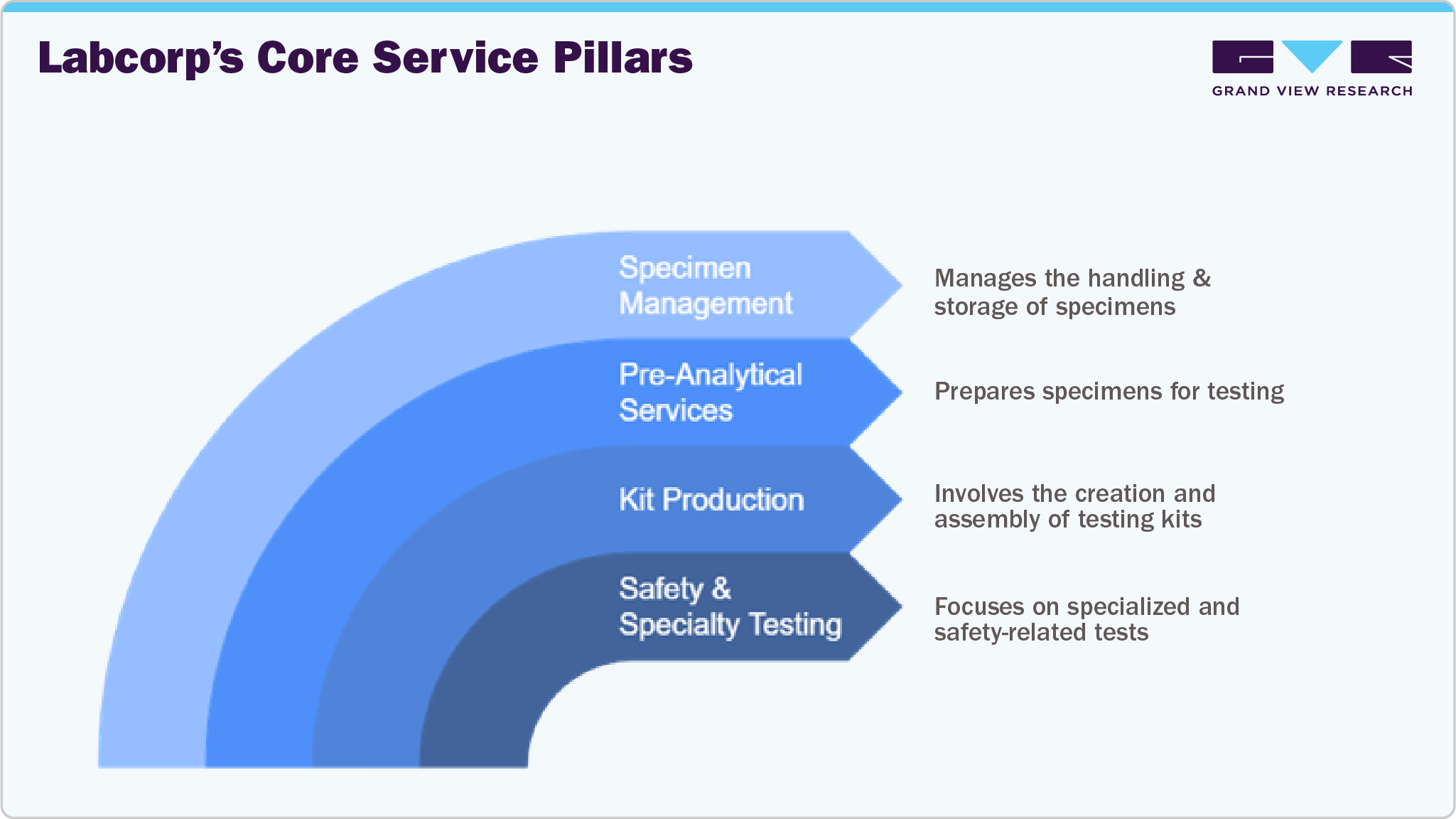
Central laboratories are pivotal in expediting the drug development process by implementing innovative strategies that address traditional challenges of time and cost. According to a November 2024 article by REPROCELL, three key approaches-automation, outsourcing, and artificial intelligence (AI) are instrumental in accelerating clinical trials and bringing new treatments to market more efficiently.
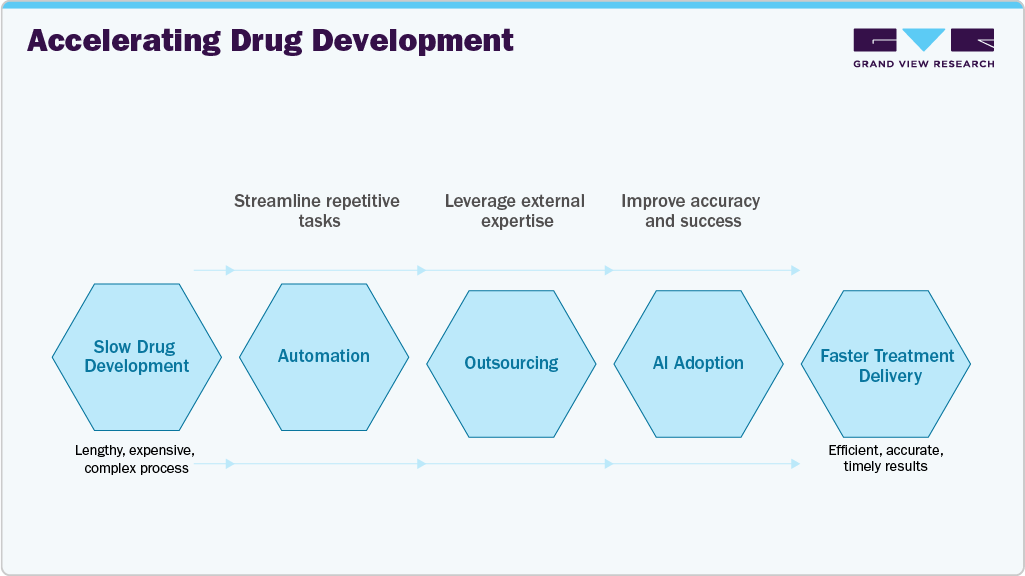
Market Concentration & Characteristics
The industry demonstrates a high degree of innovation, driven by the integration of advanced technologies like artificial intelligence (AI), automation, and next-generation sequencing (NGS). These advancements have enhanced the precision and efficiency of laboratory services. For instance, AI-driven systems are now capable of orchestrating complex laboratory workflows, leading to more streamlined operations and accelerated drug discovery processes. Additionally, the adoption of self-driving labs, which utilize AI for real-time coordination of instruments and personnel, is transforming traditional laboratory settings into more dynamic and responsive environments.
The industry experiences a high level of mergers and acquisitions (M&A), as major players seek to broaden their technological capabilities, enhance their product portfolios, and enter new regional markets. Several market players are acquiring smaller players to strengthen their market position. For example, Eurofins Scientific has been actively acquiring companies to bolster its capabilities, including the acquisition of Orchid Cellmark in the UK and Infinity Laboratories in the US. Similarly, SYNLAB Group has continued its expansion through strategic acquisitions, enhancing its diagnostic services across Europe. In India, Metropolis Healthcare has acquired Agra-based Scientific Pathology and Delhi NCR-based Core Diagnostics to strengthen its presence in North India. These M&A activities are reshaping the competitive landscape, allowing central labs to offer more comprehensive and integrated services.
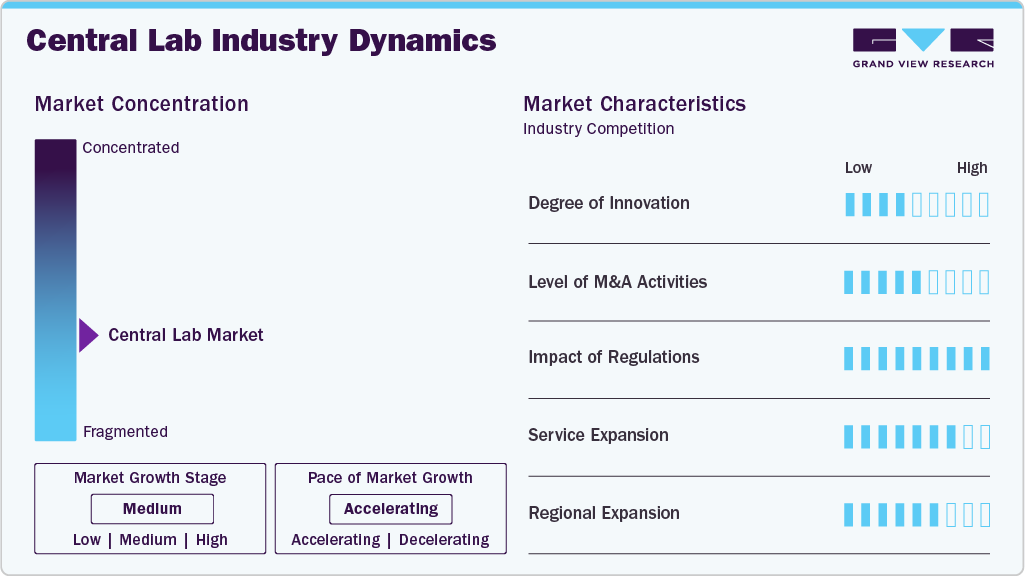
Regulatory frameworks play a pivotal role in shaping the industry. In the US, the Food and Drug Administration (FDA) has implemented new rules requiring laboratory-developed tests (LDTs) to undergo FDA authorization, aiming to ensure the accuracy and reliability of these tests. This move is expected to enhance patient safety but may also increase the operational burden on laboratories. Globally, central labs are adapting to stricter data privacy regulations, such as the General Data Protection Regulation (GDPR) in Europe, necessitating robust data management and security protocols. Compliance with these regulations is essential for maintaining trust and ensuring the integrity of laboratory services.
Service expansion in the central labs industry is at a high level, with companies diversifying their portfolios to address a broader range of diseases. There is a growing emphasis on specialized testing services, including oncology, neurology, and infectious diseases. Advancements in diagnostics, such as liquid biopsy and NGS, are enabling more precise and early detection of diseases, thereby increasing the demand for specialized lab services. Furthermore, the integration of point-of-care testing (POCT) technologies is allowing for rapid testing at the patient’s location, enhancing the accessibility and convenience of laboratory services. These expansions are positioning central labs as critical players in modern healthcare delivery.
The industry is witnessing a medium to high level of regional expansion as companies aim to tap into growth opportunities in emerging markets while solidifying their presence in established regions. Asia-Pacific, Latin America, and the Middle East are becoming key targets. In June 2024, Labcorp introduced Labcorp Global Trial Connect, a suite of central laboratory solutions designed to expedite clinical trials by streamlining workflows and reducing data delays. Asia-Pacific is emerging as the fastest-growing region in the central labs market, propelled by a surge in clinical trials and investments in healthcare infrastructure. In June 2024, Pharmaceutical Product Development (PPD) launched central laboratory services in China, recognizing the country's burgeoning clinical research landscape. Similarly, in February 2023, Cerba Research signed a Memorandum of Understanding with Teddy Clinical Research Laboratory to establish a joint venture, combining Teddy's established presence in China with Cerba's technical expertise.
Services Insights
The biomarker services segment held the largest share of 38.54% in 2024. Biomarkers represent a promising option for clinical development programs to ascertain new pathways for diagnostics and discern disease mechanisms for the development of better therapeutics. Biomarker studies provide early detection of life-threatening diseases, evaluation of the risk of side effects associated with investigation therapies, and disease progression in patients during clinical trials. Moreover, it helps in understanding a patient’s success prospects for the respective therapy, which creates opportunities for introducing personalized & precision medicines. Hence, the research related to biomarkers is one of the lucrative services offered by central laboratories, and multiple biomarkers are being used in clinical trials.
Emerging trends include advancements in omics technologies, personalized medicine, liquid biopsies for cancer detection, and the integration of artificial intelligence (AI) and machine learning in biomarker discovery and analysis. These innovations are enhancing the efficiency and accuracy of biomarker identification, enabling the development of more effective personalized medicine approaches. In August 2024, Illumina received FDA approval for its TruSight Oncology (TSO) Comprehensive test, which analyzes over 500 genes in solid tumors. This advancement improves the detection of immuno-oncology biomarkers and actionable mutations, aiding in targeted therapy selection and clinical trial eligibility.
The genetic services segment is anticipated to grow at the fastest rate over the forecast period with a CAGR of 7.79%. The growth is driven by the increasing significance of genetic analysis in clinical studies.Understanding the underlying genetic factors can aid in the development of targeted therapies for a variety of diseases, such as cancer and inheritable diseases. Furthermore, genetic differences in pathways for drug metabolism may alter a patient’s response to treatment. Hence, genetic services can add value to trial analysis and help guide treatment options.In addition, growing adoption of next-generation sequencing and growth of molecular testing options, driven by advancements in PCR technologies, are anticipated to boost the market growth for genetic services. In January 2024, Genomic Health launched a new portfolio of personalized genomic testing services to advance patient outcomes in cancer diagnostics. Additionally, in February 2024, Illumina introduced its new next-generation sequencing platform, the NextSeq 1000, aiming for greater throughput and cost-effectiveness in genomic research.
End-use Insights
Pharmaceutical companies held the largest market share of 44.78% in 2024. The pharmaceutical industry develops, manufactures, and transports pharmaceuticals or prescription products to be used as medications to be provided to patients in order to heal, vaccinate, or relieve symptoms. Pharma companies may sell generic and branded drugs as well as medical equipment. Pharmaceutical companies rely on central laboratory service providers to evaluate the efficacy of new drug products. For the evaluation of investigational drugs, the service providers offer tests such as biochemistry, hematology, histopathology, immunology, endocrinology, microbiology, real-time PCR, and clinical pathology.Furthermore, market players are partnering with pharmaceutical companies to strengthen their service offerings and expand their geographic footprint. For instance, in April 2023, Sygnature Discovery collaborated with Daewoong Pharmaceutical to boost its global innovations in drug development.
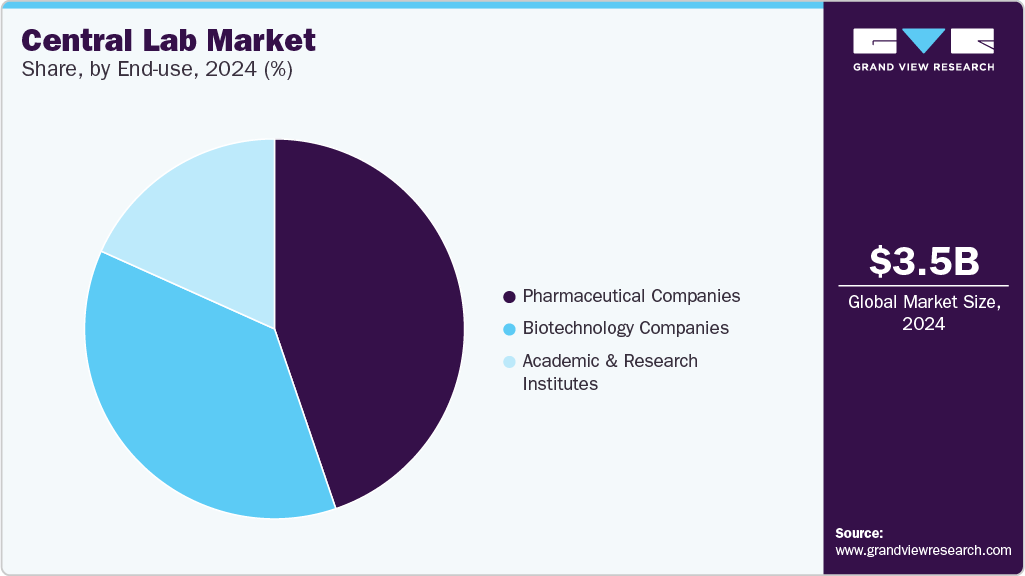
The biotechnology companies segment is anticipated to grow at the fastest rate over the forecast period.The increase in activities for the development of biological therapies is expected to drive the market in the coming years. By 2025, the U.S. FDA will approve 10 to 20 cell & gene therapy products per year.The market for cell and gene therapy-related services, which includes contract development & manufacturing, analytical testing, and regulatory consulting, has also been growing rapidly in response to the demand for these therapies. Moreover, Pace Analytical expanded its capabilities to support gene therapy projects by investing in analytical equipment, including capillary electrophoresis, Ultrapressure Liquid Chromatography (UPLC), large-molecule time-of-flight mass spectroscopy, and microplate readers.
Regional Insights
North America central lab market dominated the global industry with a share of 40.82% in 2024. The market is collectively driven by the increasing adoption of molecular testing due to its high accuracy, sensitivity, and specificity. The high prevalence of infections such as Sexually Transmitted Infections (STIs) & tuberculosis in the region is also anticipated to propel the demand for clinical research pertaining to the development of diagnostic devices and therapeutics. For instance, according to the CDC, in March 2022, in the U.S., over 20 million new cases of STIs are expected to occur annually, leading to approximately USD 10–USD 17 billion in costs per year, and the prevalence is expected to grow further.Moreover, key players are constantly focusing on expanding their presence in the field of clinical development. For instance, in July 2022, Labcorp announced the development of its spin-off company focusing on clinical development to enhance CRO capabilities. These factors are anticipated to positively impact the market growth in the region.
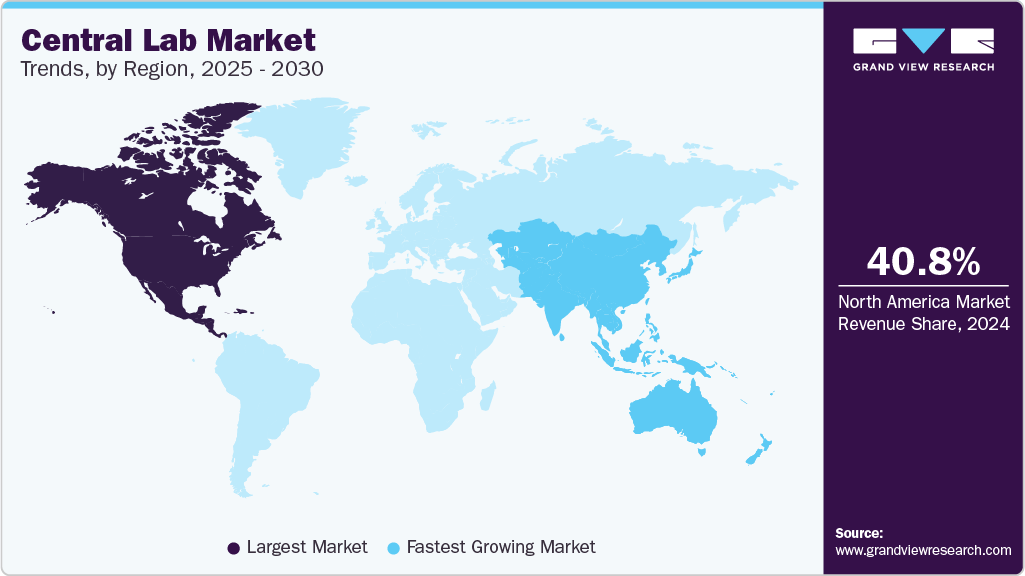
U.S. Central Lab Market Trends
The central lab market in the U.S. is advancing steadily, supported by a robust biopharmaceutical pipeline and increasing demand for specialized testing in clinical trials. The expansion of precision medicine and personalized therapies is driving sponsors to rely more heavily on centralized lab testing for consistency and data integrity. Recent developments include strategic collaborations between central labs and clinical research organizations (CROs) to streamline study timelines and enhance sample logistics. The U.S. also benefits from a well-established logistics infrastructure and digital health adoption, which allow central labs to efficiently manage large volumes of specimens. Key players are investing in automation and AI-based data analytics to boost throughput and quality control. Additionally, the rising number of decentralized and hybrid clinical trials is prompting U.S. central labs to integrate remote data collection technologies. These trends present opportunities for innovation in sample tracking systems and partnerships to support global studies led from the U.S.
Europe Central Lab Market Trends
The central lab market in Europe is experiencing steady growth, largely driven by the region’s role as a hub for multi-country clinical trials and complex biologic studies. The harmonization of regulatory requirements under the EU Clinical Trial Regulation (CTR) has simplified cross-border trial operations, benefiting central lab services. Recent developments include the integration of digital pathology and cloud-based lab data platforms that enhance cross-site collaboration. Additionally, there is a rising interest in biomarker-driven studies, which require advanced central lab capabilities such as genomic and proteomic analyses. Central labs in Europe are expanding their geographic presence to align with sponsors seeking pan-European coverage.
The UK central lab market is undergoing dynamic transformation, supported by strong clinical research infrastructure and government initiatives post-Brexit to maintain leadership in life sciences. The UK’s Medicines and Healthcare products Regulatory Agency (MHRA) has introduced streamlined processes for trial approvals, attracting international sponsors. Central labs are responding by expanding service offerings such as advanced biomarker analysis, companion diagnostics, and digital histology. Recent partnerships between academic institutions and private labs have also bolstered capacity and innovation. The increasing demand for centralized testing in oncology and rare disease trials is prompting investment in high-throughput instrumentation and AI-powered image analysis. Furthermore, with the UK prioritizing genomics and precision medicine, central labs are integrating next-generation sequencing (NGS) workflows.
The central lab market in Germany is growing steadily, propelled by the country’s reputation for high-quality clinical research and regulatory excellence. German central labs are key partners in large-scale trials conducted across the EU and are investing in automation to manage increasing test volumes. A major driver is the demand for standardized and validated laboratory results, particularly in immunology and oncology studies. Recent developments include the incorporation of electronic data capture (EDC) and integrated laboratory information management systems (LIMS) to streamline sample tracking and reporting. Collaborations with CROs and pharmaceutical firms have increased, with a focus on delivering real-time data and remote access to lab results. The government’s support for digital health and biopharma innovation is encouraging further investment in centralized lab infrastructure.
Asia Pacific Central Lab Market Trends
The central lab market in Asia Pacific is expected to witness the fastest CAGR of 7.82% over the forecast period due to the increasing adoption of central lab services in the region. The region comprises over one-third of the global population. China and India are considered prospective business hubs for clinical testing & service providers. Furthermore, with urbanization, an increase in disposable income, awareness about the prevention of severe diseases, and education, the market is expected to grow in this region. Asia Pacific markets, such as Australia, China, Korea already have healthcare reimbursement systems, which provide coverage for diagnostic tests. In addition, Positive developments like government healthcare benefits raised public knowledge, and a willingness to pay for top-notch medical care are also anticipated to fuel market expansion.
China central lab market is experiencing strong momentum, driven by a surge in domestic clinical trials and increased participation in global studies. The government’s continued push for pharmaceutical innovation and fast-track regulatory pathways has significantly expanded the clinical research landscape. Central labs in China are scaling operations to meet demand for specialized testing, particularly in oncology and cell and gene therapies. Recent developments include the adoption of AI for histopathological image analysis and cloud-based data management systems that support multicenter trials. Leading labs are also forming strategic alliances with international CROs to provide end-to-end lab services for global sponsors. Opportunities are emerging in supporting multi-regional clinical trials (MRCTs) as China becomes a key destination for patient recruitment. Moreover, as clinical trials decentralize, Chinese central labs are investing in logistics and cold chain management to ensure timely and secure sample transportation, a critical factor in maintaining data reliability and regulatory compliance.
The central labs market in Japan is advancing steadily, bolstered by a strong demand for standardized testing in global and domestic clinical trials. The country’s demographic trend of an aging population has increased research in chronic diseases and oncology, creating consistent demand for central lab services. Regulatory reforms by Japan’s Pharmaceuticals and Medical Devices Agency (PMDA) to expedite clinical trial approvals have further stimulated lab testing volumes. Recent developments include the integration of AI-driven diagnostic tools in central labs to enhance data precision and efficiency.
Latin America Central Lab Market Trends
The central lab market in Latin America is gaining traction due to rising clinical trial activity in countries like Mexico, Argentina, and Colombia. Sponsors are increasingly turning to Latin America for its cost-effective trial operations and genetically diverse populations. This has spurred demand for central lab services that ensure uniform testing standards across distributed trial sites. Recent trends include the expansion of regional central labs and the introduction of multilingual laboratory information systems to handle cross-border studies. Moreover, growing investment from global CROs and pharma companies has led to infrastructure development in urban centers. Opportunities are particularly promising in trials for infectious diseases and chronic conditions such as diabetes, where centralized testing helps maintain data integrity.
Brazil central labs market is expanding rapidly, supported by a robust healthcare system and government backing for pharmaceutical R&D. The country is a key player in Latin America’s clinical trials landscape, and central labs are crucial for managing the logistics of multi-site trials. A major driver is Brazil’s regulatory improvements, including faster approvals for clinical studies under ANVISA. Recent investments in laboratory automation, digital pathology, and cloud-based data systems have enhanced the capabilities of leading central labs. The growing trend of decentralized clinical trials has spurred interest in mobile phlebotomy and remote specimen tracking, offering new growth opportunities. Brazil’s strategic role in South American trials makes it a vital node in the global central lab network.
Middle East & Africa Central Lab Market Trends
The central lab market in the Middle East and Africa (MEA) is on a growth path, supported by expanding clinical research in countries like the UAE, South Africa, and Egypt. As pharmaceutical companies explore untapped markets, the need for reliable centralized testing has grown. In the Gulf region, particularly the UAE and Qatar, investments in clinical trial infrastructure have led to the development of new central lab facilities with international accreditations. Recent developments include partnerships between local labs and global CROs to build integrated testing networks that align with ICH-GCP standards. In Africa, donor-funded health programs are driving trials for infectious diseases, creating consistent demand for centralized testing.
Saudi Arabia central lab market is growing steadily, aligned with the country’s Vision 2030 plan to expand healthcare and become a regional hub for clinical research. Government initiatives to attract multinational pharmaceutical trials are boosting demand for advanced central laboratory services. The Saudi Food and Drug Authority (SFDA) has streamlined clinical trial processes, making the country more attractive for global sponsors. Recently, central labs have adopted automated testing platforms and electronic data capture tools to enhance efficiency and regulatory compliance. Collaborations with universities and research hospitals have increased, enabling central labs to offer a wider range of molecular and genomic testing services.
Key Central Lab Companies Insights
Key players operating in the central lab market are undertaking various initiatives to strengthen their presence and increase the reach of their products and services. Strategies such as expansion activities and partnerships are key in propelling the market growth.
Key Central Lab Companies:
The following are the leading companies in the central lab market. These companies collectively hold the largest market share and dictate industry trends.
- ACM Global Laboratories
- Labconnect
- Cerba Research
- Eurofins Scientific
- Medicover Integrated Clinical Services (MICS) (Synevo Central Labs
- Versiti (Cenetron)
- A.P. Møller Holding A/S (Unilabs)
- Ampersand Capital Partners (Pacific Biomarkers)
- Lambda Therapeutics Research Ltd
- Cirion Biopharma Research Inc.
Recent Developments
-
In June 2024, Labcorp introduced Labcorp Global Trial Connect, a suite of central laboratory solutions designed to expedite clinical trials by streamlining workflows and reducing data delays.
-
In July 2023, Versiti announced the acquisition of Quantigen, an Indiana-based company, to expand its clinical trial and service offerings.
-
In May 2023, LabConnect entered into strategic alliance with Labor Dr. Wisplinghoff to provide tailormade and high-quality central lab services in Europe.
Central Lab Market Report Scope
Report Attribute
Details
Market size value in 2025
USD 3.67 billion
Revenue forecast in 2030
USD 5.04 billion
Growth rate
CAGR of 6.56% from 2025 to 2030
Base year for estimation
2024
Historical data
2018 - 2023
Forecast period
2025 - 2030
Quantitative units
Revenue in USD million/billion, and CAGR from 2025 to 2030
Report coverage
Revenue forecast, company ranking, competitive landscape, growth factors, and trends
Segments covered
Services, end-use, region
Regional scope
North America; Europe; Asia Pacific; Latin America; MEA
Country scope
U.S.; Canada; Mexico; Germany; UK; France; Italy; Spain; Denmark; Sweden; Norway; China; Japan; India; Australia; South Korea; Thailand; Brazil; Argentina; South Africa; Saudi Arabia; UAE; Kuwait
Key companies profiled
ACM Global Laboratories; Labconnect; Cerba Research; Eurofins Scientific; Medicover Integrated Clinical Services (MICS) (Synevo Central Labs; Versiti (Cenetron); A.P. Møller Holding A/S (Unilabs); Ampersand Capital Partners (Pacific Biomarkers); Lambda Therapeutics Research Ltd; Cirion Biopharma Research Inc.
Customization scope
Free report customization (equivalent up to 8 analyst’s working days) with purchase. Addition or alteration to country, regional & segment scope.
Pricing and purchase option
Avail customized purchase options to meet your exact research needs. Explore purchase options
Global Central Lab Market Report Segmentation
This report forecasts revenue growth and provides an analysis of the latest trends in each of the sub-segments from 2018 to 2030. For this study, Grand View Research has segmented the global central lab market report on the basis of services, end-use, and regions:
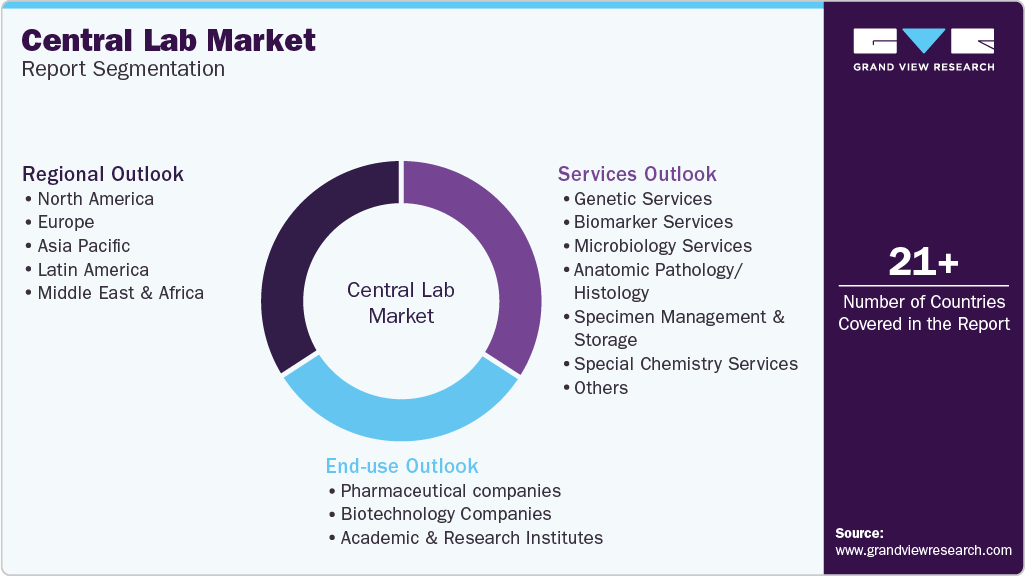
-
Services Outlook (Revenue, USD Million, 2018 - 2030)
-
Genetic Services
-
Biomarker Services
-
Microbiology Services
-
Anatomic Pathology/ Histology
-
Specimen Management & Storage
-
Special Chemistry Services
-
Others
-
-
End-use Outlook (Revenue, USD Million, 2018 - 2030)
-
Pharmaceutical companies
-
Biotechnology Companies
-
Academic and Research Institutes
-
-
Regional Outlook (Revenue, USD Million, 2018 - 2030)
-
North America
-
U.S.
-
Canada
-
Mexico
-
-
Europe
-
Germany
-
UK
-
France
-
Italy
-
Spain
-
Denmark
-
Sweden
-
Norway
-
-
Asia Pacific
-
Japan
-
China
-
India
-
Australia
-
South Korea
-
Thailand
-
-
Latin America
-
Brazil
-
Argentina
-
-
Middle East and Africa (MEA)
-
South Africa
-
Saudi Arabia
-
UAE
-
Kuwait
-
-
Frequently Asked Questions About This Report
b. The global central lab market size was estimated at USD 3.46 billion in 2024 and is expected to reach USD 3.67 billion in 2025.
b. The global central lab market is expected to grow at a compound annual growth rate of 6.56% from 2025 to 2030 to reach USD 5.04 billion by 2030.
b. Biomarker services dominated the central lab market with a share of 38.54% in 2024. This is attributable to their use in discerning the disease mechanisms for the development of better therapeutics.
b. Key players operating in the central lab market are ACM Global Laboratories, LabConnect, Cerba Research, Eurofins Scientific, Medicover Integrated Clinical Services, Versiti, A.P. Møller Holding A/S, Ampersand Capital Partners, Lambda Therapeutics Research Ltd, and Cirion Biopharma Research Inc.
b. Key factors that are driving the central lab market growth include increasing investment in R&D and increased focus of sponsors & investigators on reducing research costs. The outsourcing of central lab work is further driving the market growth.
Share this report with your colleague or friend.
Need a Tailored Report?
Customize this report to your needs — add regions, segments, or data points, with 20% free customization.

ISO 9001:2015 & 27001:2022 Certified
We are GDPR and CCPA compliant! Your transaction & personal information is safe and secure. For more details, please read our privacy policy.
Trusted market insights - try a free sample
See how our reports are structured and why industry leaders rely on Grand View Research. Get a free sample or ask us to tailor this report to your needs.










